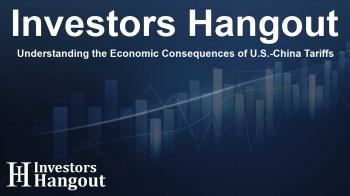Understanding the Economic Consequences of U.S.-China Tariffs

Current Trade Dynamics Between the U.S. and China
In a highly charged post, the President of the United States has made it clear that tariffs on imports from China are on the table. This follows recent developments in the trade relationship, highlighted by significant moves on both sides. The financial markets reacted quickly, indicating widespread concern over the implications of these tariffs.
The Economic Reality of Tariffs
As policymakers mull over these potential tariffs, a surprising revelation has come to light: the economic cost to American consumers might be greater than expected. Forecast models suggest that consumer prices could surge by 2-4% in the coming months due to tariffs, especially in an environment where inflation is already a pressing issue.
Inflationary Pressures and Consumer Spending
The Federal Reserve has been working to manage price levels, but the proposed tariffs could push inflation up to nearly 6%, well above their standard goal. This growing inflation will likely lead to a decrease in consumer confidence and spending power, impacting overall economic growth.
Projected Effects on GDP
Tariff escalations have a direct impact on the economic output of the nation. Various forecasts indicate that U.S. GDP could contract significantly, with estimates showing a potential reduction of 1.5-2% annually over time. This stark contrast underscores the potential for a recession-like climate without typical triggers.
China's Resilience Amid Economic Fluctuations
In comparison, China's likely GDP contraction appears more muted, positioned at a range between 0.8-1.2%. This difference highlights the challenges that could face the U.S. economy compared with its Chinese counterpart, sparking discussions on economic resilience.
Industry-Specific Implications
Different sectors will bear the weight of these tariffs in varied measures. The consumer electronics sector, particularly companies like Apple Inc. (NASDAQ: AAPL), may see considerable impacts due to their reliance on Chinese manufacturing. Anticipated tariff costs could add hundreds of dollars to devices like the iPhone, affecting consumer purchasing decisions.
Challenges in the Automotive Industry
Automotive manufacturers, represented by giants such as Ford Motor Co. (NYSE: F), face a complex situation where tariff-induced costs could add significant amounts to vehicle prices. The interconnected nature of global supply chains complicates quick adjustments, making adaptation more challenging.
The Broader Economic Landscape
As tariffs take hold, the structure of wealth distribution may shift considerably. Despite the predicted downturn in economic activity, tariff revenues could yield a surprising $400-500 billion annually for the government, funded at the expense of the American consumer.
Sector Vulnerability and Price Increases
Specific industries like steel and aluminum are expected to face steep price increases, which won’t only affect those sectors but will ripple through construction and manufacturing as well. Retailers like Walmart Inc. (NYSE: WMT) and Target Corp. (NYSE: TGT) may see similar pressure, as increased costs translate into higher prices for consumers.
Investment Strategies in a Changing Environment
As investors react to these shifting dynamics, it becomes clear that the logical play involves a mix that leans heavily toward defensive positions. Key industries focused on domestic markets with minimal reliance on China will likely become more appealing.
Shifts in Production and Supply Chains
Manufacturing strategies will also adapt, placing focus on nearshoring. Companies such as Caterpillar Inc. (NYSE: CAT) could benefit significantly from production shifts to Mexico, which remains a favorable alternative in the face of increasing tariffs.
Long-Term Outlook: What Lies Ahead
This current trade landscape is shaping up to be a significant factor in the global economic framework, suggesting that the old systems may not be adequate for future challenges. As shifts in trade policies continue, businesses might need to adopt innovative approaches to manage their international relationships effectively.
Frequently Asked Questions
What are the potential consumer impacts of U.S.-China tariffs?
Consumers may experience higher prices on a wide range of goods, from smartphones to clothing, making everyday products more expensive.
Which sectors will be most affected by the tariff increases?
Sectors like electronics, automotive, and steel will likely see significant price increases due to their dependence on imports from China.
How will tariffs affect the U.S. economy overall?
Economic projections indicate a possible reduction of 1.5-2% in GDP growth due to the tariffs, which could lead to recession-like conditions.
Are there beneficiaries from this trade situation?
Yes, some sectors are likely to benefit, particularly those that focus on domestic production, technology, and services that reduce dependency on Chinese imports.
What should investors consider during this economic shift?
Investors may want to prioritize defensive positions and companies with strong domestic focus to mitigate risks associated with tariffs.
About The Author
Contact Dylan Bailey privately here. Or send an email with ATTN: Dylan Bailey as the subject to contact@investorshangout.com.
About Investors Hangout
Investors Hangout is a leading online stock forum for financial discussion and learning, offering a wide range of free tools and resources. It draws in traders of all levels, who exchange market knowledge, investigate trading tactics, and keep an eye on industry developments in real time. Featuring financial articles, stock message boards, quotes, charts, company profiles, and live news updates. Through cooperative learning and a wealth of informational resources, it helps users from novices creating their first portfolios to experts honing their techniques. Join Investors Hangout today: https://investorshangout.com/
The content of this article is based on factual, publicly available information and does not represent legal, financial, or investment advice. Investors Hangout does not offer financial advice, and the author is not a licensed financial advisor. Consult a qualified advisor before making any financial or investment decisions based on this article. This article should not be considered advice to purchase, sell, or hold any securities or other investments. If any of the material provided here is inaccurate, please contact us for corrections.

